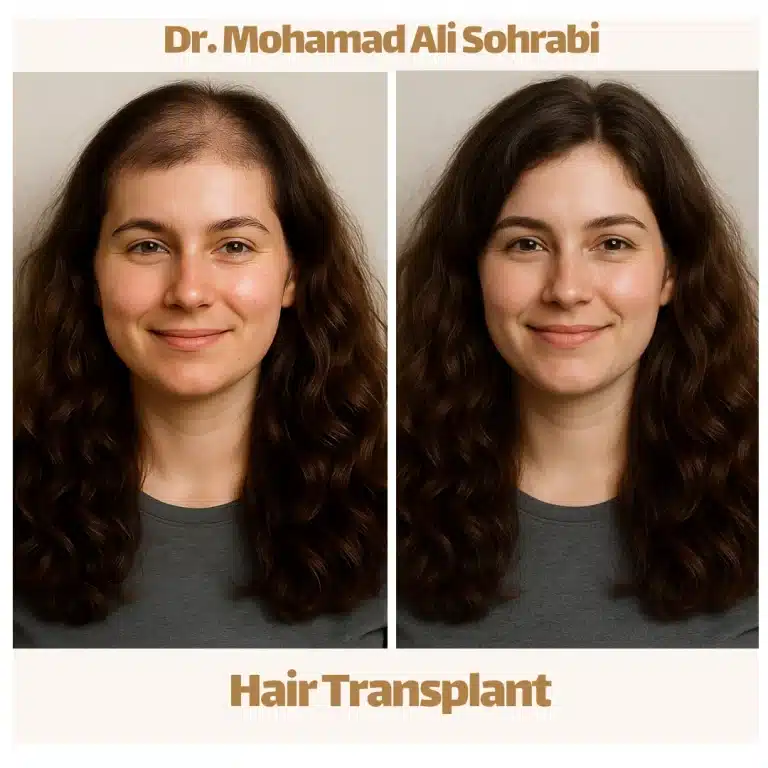Introduction: Women's Hair Transplantation
Hair loss is no longer just a male concern. In the last decade, and especially since 2020, the number of women seeking hair transplants has grown significantly. Global statistics from the International Society of Hair Transplant Surgeons (ISHRS) show that the proportion of women among hair transplant candidates has increased from 14% in 2010 to over 35% in 2025.
But why has this change occurred? In this article, we take a closer look at the reasons, new technologies, societal attitudes, and the specific challenges women face in their journey to hair restoration.

💎Changing social attitudes towards beauty and hair
Until a few years ago, hair transplants were mostly seen as a solution for balding men. But with the spread of social media, the growth of the beauty industry, and cultural pressures on women’s appearance, hair has become a major indicator of self-confidence.
In the age of “selfies” and visual content, women tend to have fuller faces and thicker hair.
The media and celebrities (from Kim Kardashian to Iranian actors) play a big role in normalizing this procedure.
In Iran, too, with the increased access to specialized clinics, the taboo of “hair cosmetic surgery” for women has largely disappeared.
💎Medical causes of female hair loss
Hair loss in women can have a variety of causes, many of which are related to hormonal changes.
🔸 1. Hormonal disorders
Pregnancy, menopause, polycystic ovary syndrome (PCOS), and taking birth control pills can cause hair loss.
In such situations, the pattern of hair loss in women is different from that of men and is more commonly seen as a general thinning of the hair at the crown of the head.
🔸 2. Stress and lifestyle
Increased job and daily stress, irregular sleep, and poor nutrition increase cortisol levels in the body, which is one of the main factors in hair loss.
🔸 3. Genetics
In some families, pattern baldness or thinning hair is inherited, but new treatments such as FUE have made this problem solvable.
💎New hair transplant technologies for women
Technological developments have made hair transplantation easier and more natural for women.
🔸 FUE (Follicular Unit Extraction)
In this method, hair follicles are extracted from the back of the head in a granular manner and implanted in sparse areas.
✅ No need for stitches
✅ No visible suture lines
✅ Faster recovery time
✅ Suitable for women who do not want to shave their hair
🔸 DHI (Direct Hair Implantation)
A newer generation of hair transplantation in which follicles are implanted directly into the scalp with special pens (Implanter Pen).
The result: higher density and a more natural hairline, without the need to shave the entire head.
🔸 PRP (Platelet Rich Plasma)
PRP injections before or after the implantation procedure help to regenerate the skin and stimulate follicle growth.
💎Why is the number of hair transplants among women increasing?
🔸 1. Technological advancement
Newer techniques no longer require complete shaving of the hair, so women are more comfortable deciding to have the procedure.
🔸 2. Increased awareness and education
With the growth of Instagram and educational videos, women have become more familiar with the hair transplant process and its real-world results.
🔸 3. Reduced costs
In Iran, the cost of hair transplants for women ranges from 10 to 40 million Tomans depending on the procedure and clinic — much less than in European countries.
🔸 4. Social pressure and beauty standards
In today’s world, thick hair is a sign of youth and health. Many women are looking to restore their “lost self-confidence.”
💎Women's specific challenges in hair transplantation
Although technology has advanced, hair transplantation in women still requires special care.
Weaker hair bank than in men
Limitations in harvesting from the back of the head due to a more extensive pattern of hair loss
Importance of determining the density and direction of hair growth for a more natural result
Special care to prevent inflammation and shock after the procedure

💎Post-hair transplant care in women
💧 Washing and cleansing
On the third day after the operation, you can start washing gently with a special shampoo.
☀️ Avoiding sun and heat
You should not be exposed to direct sunlight or a hot hair dryer for at least 2 weeks.
🍎 Nutrition and supplements
A diet rich in protein, zinc, biotin, and iron can accelerate the growth of transplanted hair.
🕊️ Waiting for the final result
The final results usually appear between 9 and 12 months after the operation.
💎The Future of Hair Transplants for Women in 2025 and Beyond
- According to reports from clinics in Turkey and South Korea, the market for female hair transplants will grow by about twofold by 2030.
The trend towards less invasive methods, the use of stem cells and printing artificial follicles is progressing.
In Iran, the demand for doctors specializing in this field has also increased sharply.
📌Conclusion: Beauty and self-confidence are everyone's right.
Hair transplantation for women is no longer a taboo, but a scientific and reliable way to restore self-confidence.
By choosing a specialist doctor, carefully examining the cause of hair loss, and following post-operative care, a natural and lasting result can be achieved.
This process is not only a global trend, but also a sign of medical progress and a changing attitude of society towards true beauty.
Frequently Asked Questions Everything about Women's Hair Transplantation
❓1. Does hair transplantation for women have permanent results?
Yes, if the procedure is performed by a specialist and healthy follicles are extracted from the appropriate hair bank, the results of female hair transplantation are permanent. However, post-operative care (such as nutrition, stress management, and supplementation) play an important role in longevity.
❓2. Is it necessary to shave hair for hair transplantation in women?
No, one of the advantages of new methods such as FUE and DHI is that women do not need to shave their entire head. Only a small section at the back of the head is cut to extract the follicle, which is covered by the surrounding hair.
❓3. What is the best hair transplant method for women?
In most cases, the DHI or FUE method without shaving is the best choice. These methods are highly precise, create natural density, and have a shorter recovery time.
❓4. How much does hair transplantation cost for women?
The cost of hair transplants for women varies depending on the procedure, number of grafts, and the experience of the doctor, but in Türkiye or Europe it can cost up to three times more.
❓5. Can all women have hair transplants?
No. If the cause of hair loss is due to active hormonal problems or skin diseases, the main treatment should be done first. In cases where there is not enough hair bank or hair loss is still active, the doctor may postpone the transplant.
❓6. When does new hair grow after hair transplantation?
Typically, transplanted hair starts to grow from the third month, and the full result can be seen between 9 and 12 months after the procedure. During this period, it is very important to follow the doctor’s recommendations so that the result is natural and lasting.





